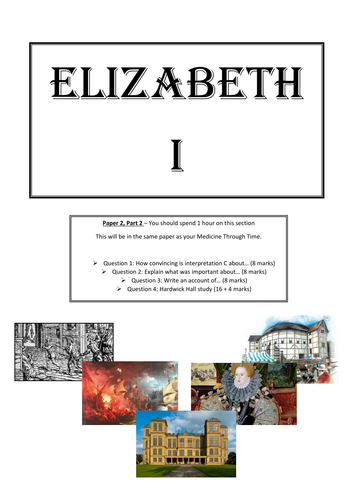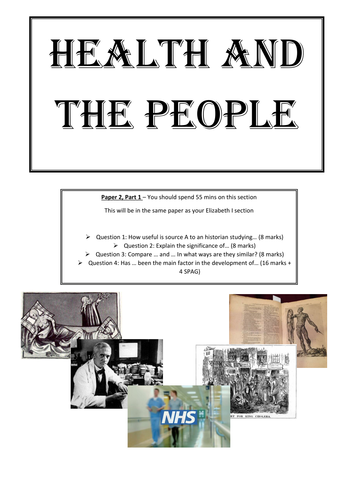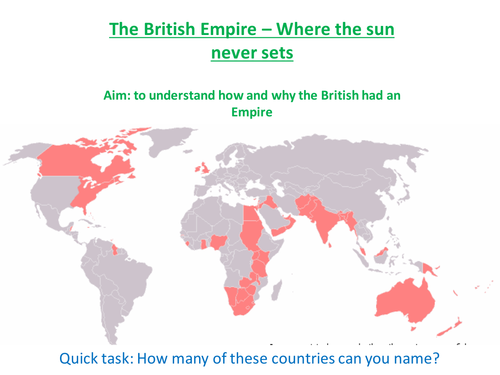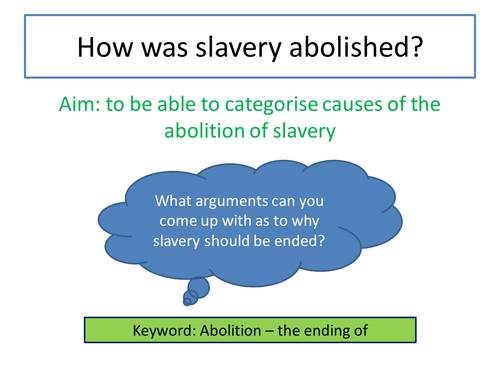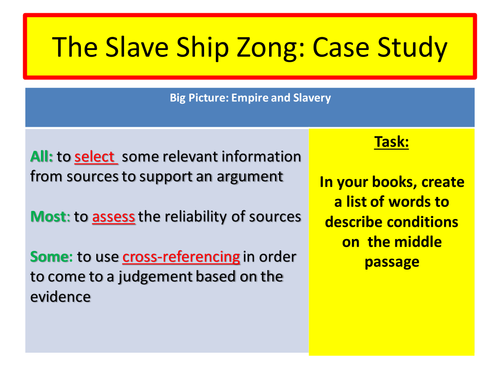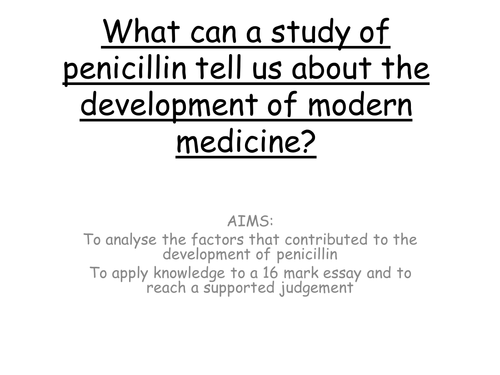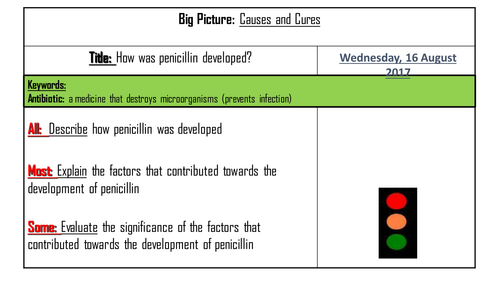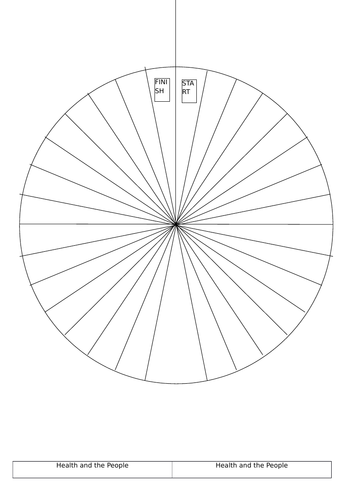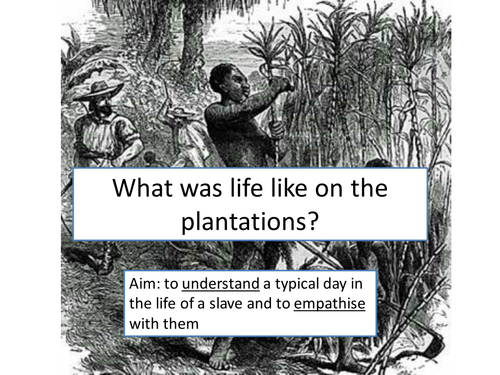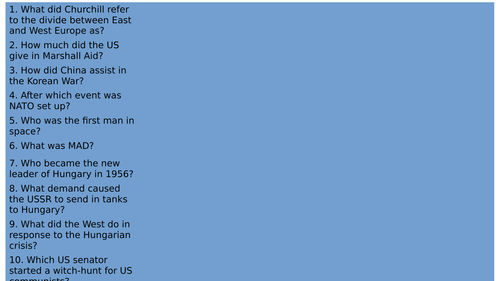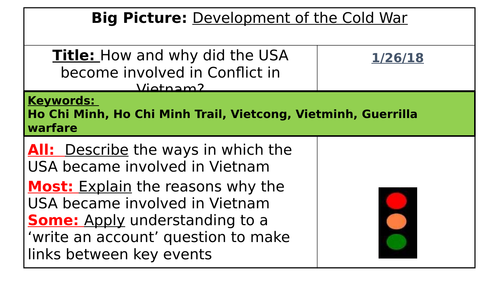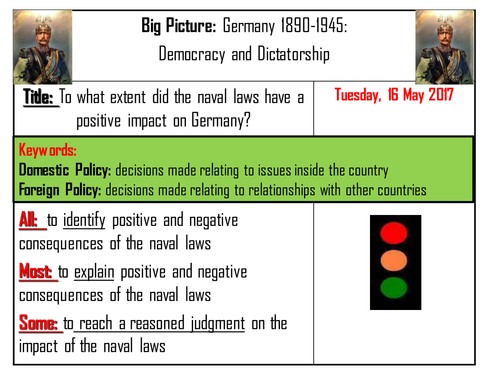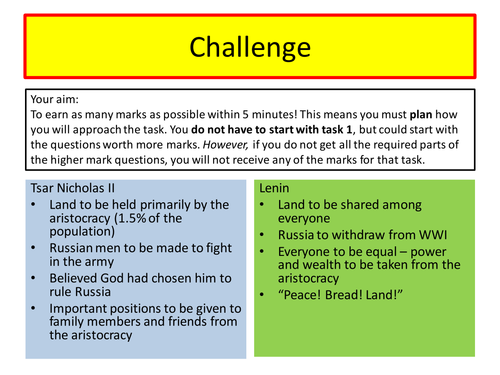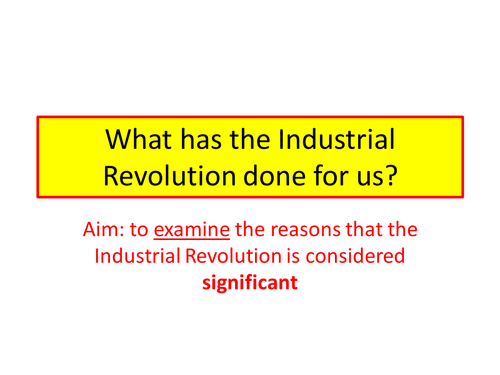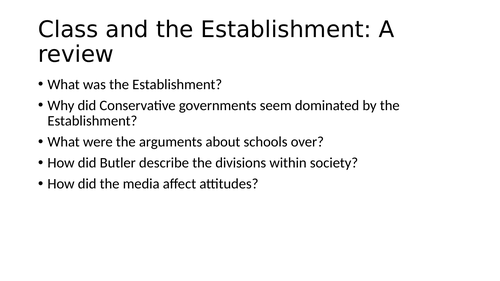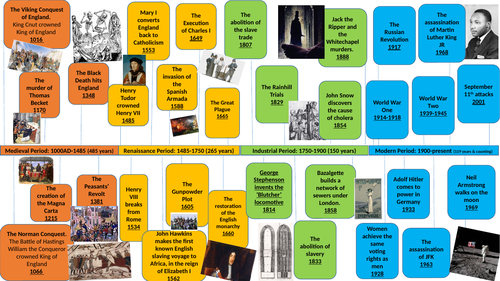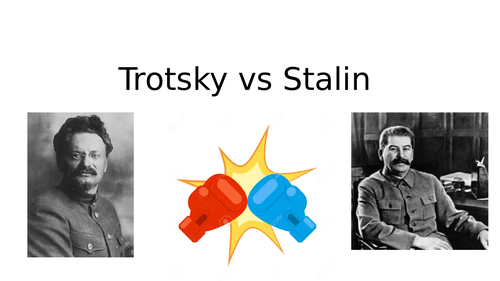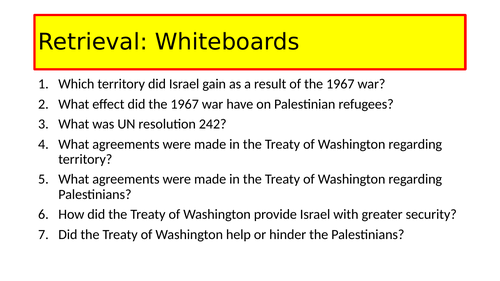
170Uploads
40k+Views
18k+Downloads

Why did Britain want an Empire?
A KS3 lesson on the reasons for an Empire. The lesson includes a game in which students must 'scramble' to gain territory in Africa, after which they prioritise reasons for building an Empire.

Abolition of Slavery
A KS3 lesson in which students categorise the reasons for the ending of slavery. Students will gather evidence and begin to consider the most important factor in ending slavery.
Bundle

AQA 8145 - Conflict and Tension Cold War: Transformation of the Cold War
A series of lessons covering the last part of the AQA GCSE specification from the impact of the Berlin Wall to Detente. Includes a range of exam style questions and guidance for students alongside content.

Slavery - Slave Ship Zong case study
A KS3 lesson on the case study of the slave ship zong. Students examine evidence in order to reach a verdict on the case. The lesson is differentiated with different tasks for lower ability (orange), middle ability (blue) and higher ability (yellow) students, so is easily adaptable for either mixed ability or classes that are set.

AQA 8145 Medicine - Introduction of penicillin
A GCSE lesson in which students will gain an understanding of the development of penicillin from its first discovery to its mass production. Students will also categorise the reasons into key factors and reach a judgement on the most important factor in the development of penicillin.

AQA 8145 Medicine - Development of Penicillin
A GCSE lesson in which students explain and evaluate the role of key factors in the discovery and subsequent development of penicillin before using their understanding to complete an 8 mark 'compare' exam style question.

AQA 8145 Medicine: Health and the People - Revision games
3 revision games which can be used in class for the whole lesson, or for a few minutes. Includes articulate cards and a board which are organised in to themes of causes, cures and treatments; public health; surgery and key people. Also includes a game of memory match and a board game (dice needed) with key questions.

AQA 8145 Medicine - Health and the People Revision Guide
A revision guide tailored to the AQA Health and the People specification for GCSE. The guide is split in to three main themes in line with the 16 mark question: Understanding Causes and Cures; Public Health and Surgery. Includes practice questions and quizzes to aid revision. The information is broken down to make it easier for students to use in their own revision, and pictures and acronyms will help students to recall the information ready for their GCSE exam. Students will also find a guide to the key factors throughout the guide to help students prepare for the 16 mark question.

Slavery - Life on Plantations
A KS3 lesson examining key areas of life on plantations. Students will gather information by becoming an expert in one area, and then use this to answer a 'how useful' question in the style of a GCSE question. Includes differentiated resources for lower ability students.

AQA 8145: Conflict and Tension Cold War - U2 Crisis
A GCSE lesson in which students will analyse evidence to reach a judgement as to why the Paris Peace Summit failed. Includes exam practice and source analysis tasks to develop the necessary skills for their GCSE exam.

AQA 8145 - Conflict and Tension Cold War 1945-72: Vietnam War
A GCSE lesson in which students will examine how and why the US became involved in conflict in Vietnam, based on the new AQA specification. Students will put together a detailed chronology of the events before planning and writing an 8 mark 'write an account' question in line with the new GCSE exam paper.

AQA 8145 Germany - Naval Laws
Lesson 3 for Germany: Democracy and Dictatorship. This lesson covers both the causes and the consequences of the naval laws. This is relevant for students studying GCSE.

Russian Revolution - an introduction
An introductory lesson as an overview on the causes of the Russian Revolution. Planned for a KS3 scheme of work, but could also be used at GCSE, the lesson includes differentiated worksheets to help students to build key skills for essay writing. By the end of the lesson, students will be able to make a prediction about the causes of the Russian Revolution.

How significant was the industrial revolution?
A KS3 lesson on the significance of the industrial revolution. Includes differentiated tasks for lower ability students. Students will use criteria in order to assess the significance.

Making of Modern Britain - youth culture 1950s
An A-level lesson in which students examine the reasons for the development of youth culture in the 1950s. Students will use their understanding to examine three conclusions to focus on exam technique, and consider the strengths and weaknesses with the conclusions. Furthermore, students will link their understanding of youth culture to other social changes to analyse the moral panic and reactions to the development of youth culture.

AQA 7142 Making of Modern Britain - Women 1950s
An A-level lesson in which students examine the extent to which the lives of women were changed during the 1950s. Students will analyse the extent to which lives have changed for women economically and socially.

What was Tudor England like?
A KS3 introductory lesson to the topic of the Tudors. Students will gain an introduction to key themes and a sense of period as they understand life in Tudor England.

Russia's problems 1894 (OCR A-level)
An introduction to OCR Unit 2, Russia 1894-1941. Students will understand and analyse the key problems that Russia faced in 1894 and consider whether Nicholas II was the right man for the job. Students will develop links between problems to begin to understand the interplay of political, economic and social factors.

Russia - Stalin's defeat of Trotsky
An A-level lesson looking at how Stalin defeated Trotsky in his rise to power. Students will compare the relative strengths of Stalin and Trotsky by completing a set of Top Trumps cards (included in the PowerPoint) in order to evaluate the relative strengths of the two leadership contenders. Students will reach judgements on their strengths in areas such as their positions within the party, their ideology and their ability to position themselves as Lenin’s successor. Ultimately, students will reach judgements on the roles of Stalin and Trotsky in the outcomes, and compare the relative importance of a range of factors. Includes a retrieval task from their previous learning.

Middle East - first Intifada Y321
An A-level lesson for OCR Y321 focused on the theme of Zionism, Israel and the Palestinian Issue. Students will consider the causes and consequences of the first Intifada by considering the role of Jewish settlements in occupied territories, and the significance of the Intifada for the Palestinian issue. Students will have the opportunity to compare the significance of this event to those they have already studied and begin to consider where the greater turning points are.

